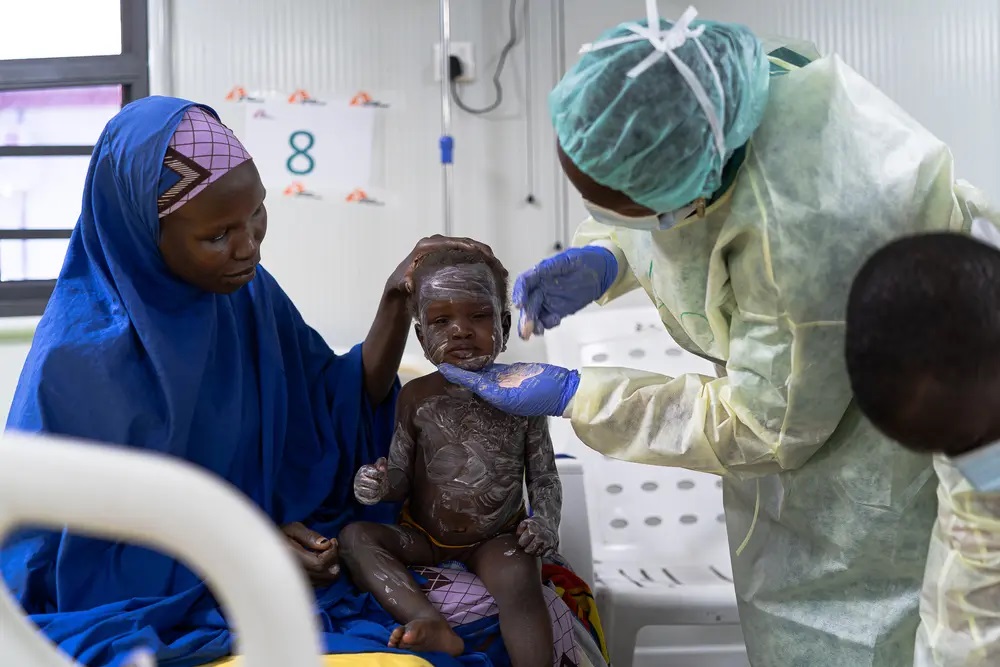Health
MSF Closes Final Ebola Projects For Survivors
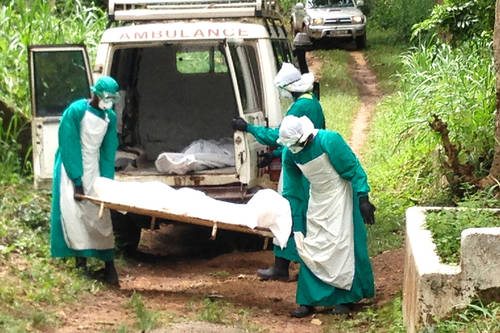
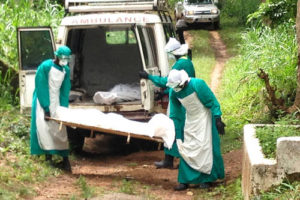
By Modupe Gbadeyanka
The Ebola outbreak that swept across West Africa infected more than 28,700 people and killed more than 11,300 men, women and children.
Whole families were ripped apart and communities were devastated by the disease, which saw schools close, economies grind to a halt and health systems collapse, leading to even greater loss of life.
The shocking human toll of the outbreak was exacerbated by the painfully slow international response.
“The suffering caused by the Ebola outbreak was immeasurable,” says Brice De La Vingne, operations director for MSF. “It has left an indelible mark on every MSF staff member who travelled to work in West Africa. For our staff from the region, the impact was even greater – they were living with the daily threat of the disease, while at work they faced the devastating reality of Ebola head on. But for those who were infected with the disease, and for their families, it was nothing short of hell.”
Those who survived Ebola often found the battle was not over – many faced significant medical and mental health problems. However, because there had never before been an outbreak of this magnitude, there was limited understanding of what assistance people would need to pick up the pieces.
“As the outbreak subsided, it became apparent that Ebola survivors and their families would need significant support,” says Petra Becker, MSF head of mission in Liberia. “The majority of survivors experienced physical disorders such as joint pain and neurological or ophthalmological problems. At the same time, many survivors, as well as their friends, family and caregivers, experienced significant mental health problems, including post-traumatic stress disorder and depression, after being confronted so closely with death.”
MSF set up dedicated survivors’ clinics in the three worst affected countries.
The first opened in Monrovia, Liberia, in January 2015 and provided more than 1,500 medical consultations before closing in August 2016.
A second clinic in Guinea, Conakry, cared for 330 survivors and more than 350 of their relatives in the Coyah and Forécariah districts of the city.
A similar clinic in Freetown, Sierra Leone, provided mental and medical healthcare to more than 400 survivors and their families, organising more than 450 individual and group sessions to provide psychological support.
“Over time and after treatment, the severity of people’s psychological and physical disorders has gradually diminished,” says Jacob Maikere, MSF head of mission in Sierra Leone. “Yet many survivors say that they are still deeply disturbed by the smell of chlorine, which immediately transports them back the horror of the Ebola management centres.”
Fight against discrimination and stigma
Ebola survivors and their families also faced stigma when they returned to their communities.
MSF, together with other organisations and alongside national initiatives, sent teams out into affected communities to spread health messages and to help reduce stigma and discrimination. In Guinea, for example, MSF reached 18,300 people through group and individual sessions.
“Stigma remains a huge issue for those who survived Ebola and for their families, despite awareness and information campaigns during and after the outbreak,” says Jacob Maikere. “The discrimination takes many forms, with people losing their jobs or their partners, or being rejected by their family or community, all of which can have a hugely destabilising impact on their lives.”
Health workers hard hit
Health workers in the three worst affected countries paid a heavy price for responding to the disease, with many losing their lives. Those who survived witnessed countless deaths, and had to live with the fear that they too would be infected in their own communities as Ebola spread.
“Health workers in Sierra Leone, Guinea and Liberia saved many of their fellow citizens from Ebola,” says Ibrahim Diallo, MSF head of mission in Guinea. “But the virus created such fear in the country that many were viewed with suspicion or even discriminated against because of the contact that they had with people who were sick.”
MSF handing over post-Ebola care
In late-September, MSF ended its medical and mental health programmes for survivors in Guinea and Sierra Leone, while in Liberia, post-Ebola activities will finish before the end of the year. Most medical conditions affecting survivors, such as eye and joint problems, have now been treated, and MSF has arranged for those who need ongoing mental health support to receive continuing care within their national health systems or from other organisations.
Continued MSF care in West Africa
MSF says it will continue its efforts to provide services focusing on the unmet health needs of vulnerable people throughout the three affected countries.
“Any strengthening of health services in the three affected countries must include improving infection control measures, surveillance systems to ensure early monitoring of potential cases, and basic contingency plans allowing for a quick response to an outbreak of Ebola or other diseases,” says Mit Philips, health policy advisor for MSF. “The countries also need catch-up plans for services that lapsed during the epidemic, such as treatment for HIV and TB, as well as preventative services for which coverage remains low.”
In Monrovia, MSF has opened a paediatric hospital, Bardnesville Junction Hospital. Between January and August 2016, the hospital provided more than 3,280 emergency consultations and admitted 880 children as inpatients, mainly for malaria. The hospital’s neonatal unit has cared for 512 newborn babies.
MSF is also continuing to provide care to HIV patients in Conakry, the capital of Guinea, and maternity care in the Tonkolili and Koinadugu districts in Sierra Leone. The organisation has also positioned emergency supplies in the region to make sure that medical teams can respond quickly to a future outbreak of Ebola or to other epidemic threats.
Health
Polaris Bank Sponsors Free Breast, Prostate Cancer Screenings
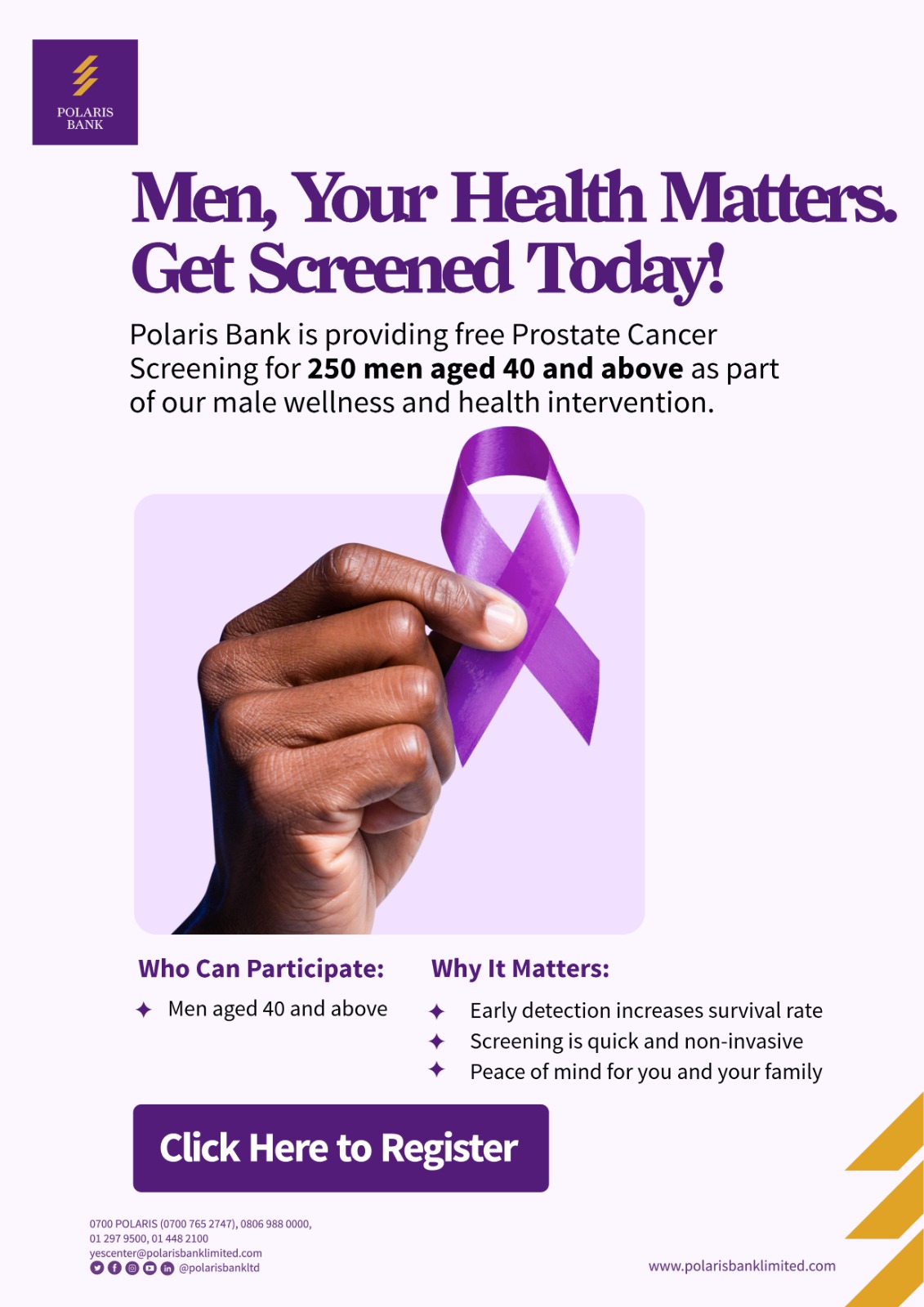
By Modupe Gbadeyanka
To commemorate World Cancer Day observed on Wednesday, February 4, 2026, Polaris Bank Limited is bankrolling free screenings for breast and prostate cancers across the country.
The financial institution partnered with a non-governmental organization (NGO) known as Care Organization and Public Enlightenment (COPE) for this initiative.
At least 100 women would be screened during the exercise, scheduled for Saturday, February 21, 2026, at the C.O.P.E Centre on 39B, Adeniyi Jones Avenue, Ikeja, Lagos, from 10:00 am to 2:00 pm.
The exercise will be conducted by trained health professionals and volunteers, ensuring participants receive both screening services and educational guidance on cancer prevention, self-examination, and follow-up care.
To participate in the free breast cancer screening programme, the applicants must be women, must be Polaris Bank account holders, and must have registered ahead of the day via bit.ly/BCS2026, with selection based on early and confirmed submissions.
Polaris Bank said the initiative was designed to promote awareness, screening, early detection, and preventive care, reinforcing its belief that access to health services is a critical foundation for individual and economic well-being.
The organization is already supporting an on-going free prostate cancer screening programme for 250 men aged 40 years and above across Nigeria.
The prostate cancer screening is being conducted at the Men’s Clinic, situated at 18, Commercial Avenue, Sabo, Yaba, Lagos, providing accessible, professional medical support for male participants seeking early detection and preventive care for prostate cancer.
Both initiatives (free breast and prostate cancer screenings) directly aligns with the United Nations Sustainable Development Goals, particularly SDG 3 (Good Health and Well-being) through improved access to preventive healthcare and early detection services, SDG 5 (Gender Equality) by prioritizing women’s health and empowerment, and SDG 17 (Partnerships for the Goals) through strategic collaboration with civil society organizations such as C.O.P.E to deliver community-centered impact.
Educational materials, community engagement sessions, and digital awareness campaigns will be deployed to reinforce key messages around early detection, lifestyle choices, and the importance of regular medical check-ups.
The Head of Brand Management and Corporate Communications for Polaris Bank, Mr Rasheed Bolarinwa, emphasised that early detection remains one of the most effective tools in the fight against cancer.
Health
NSIA Gets IFC’s Naira-financing to Scale Oncology, Diagnostic Services
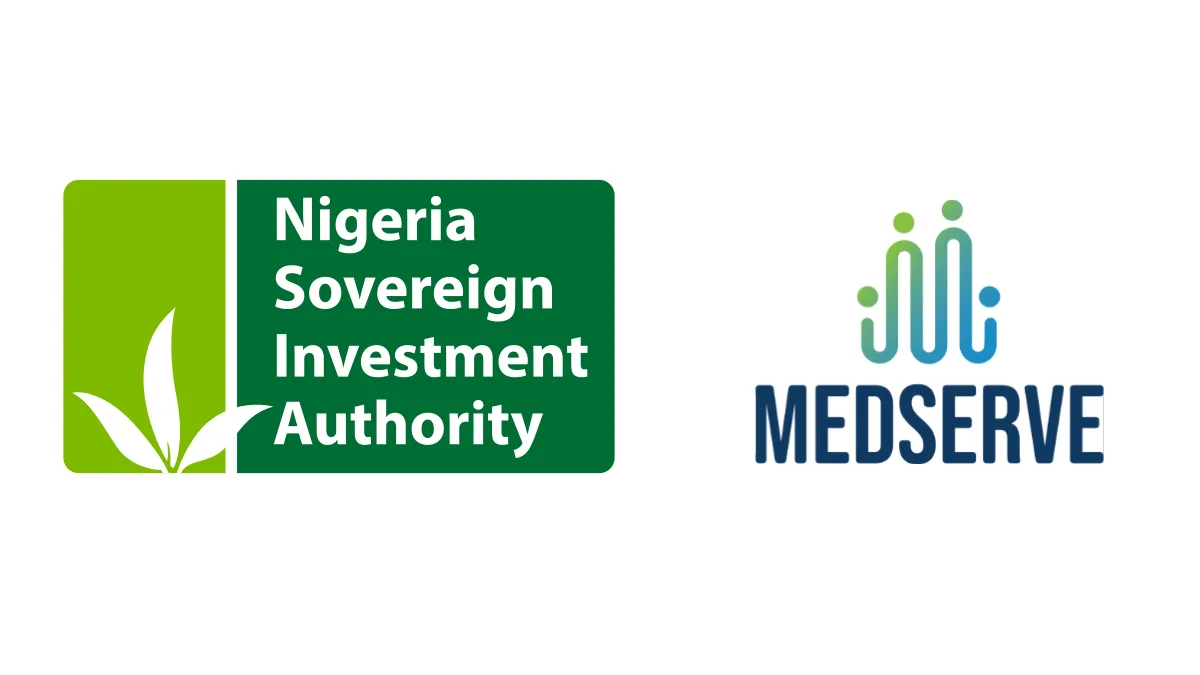
By Adedapo Adesanya
International Finance Corporation (IFC), a subsidiary of the World Bank, and the Nigeria Sovereign Investment Authority (NSIA) have partnered to provide Naira-denominated financing to NSIA Advanced Medical Services Limited (MedServe), a wholly owned healthcare subsidiary of the country’s wealth fund.
Supported by the International Development Association’s Private Sector Window Local Currency Facility, this financing enables MedServe to scale critical healthcare infrastructure while mitigating foreign exchange risks. IFC is a member of the World Bank Group.
The funds will support MedServe’s expansion program to establish diagnostic centers, radiotherapy-enabled cancer care facilities, and cardiac catheterisation laboratories across several Nigerian states.
These centres will feature advanced medical technologies, including CT and MRI imaging, digital pathology labs, linear accelerators, and cardiac catheterisation equipment, thereby enhancing specialised diagnostics and treatment.
MedServe provides sustainable service delivery with pricing that matches local income levels, helping ensure broader access to affordable oncology care for low-income patients.
The initiative will deliver over a dozen modern diagnostic and treatment centers across Nigeria, create 800 direct jobs, and train more than 500 healthcare professionals in oncology and cardiology specialties.
The total project size is $154.1 million, with IFC contributing roughly N14.2 billion ($24.5 million) in long-tenor local currency financing, marking IFC’s first healthcare investment in Nigeria using this structure.
This comes as Nigeria advances its aspirations for Universal Health Coverage. This partnership provides an opportunity to leverage private investment to complement government efforts to expand oncology care and diagnostic services.
IFC’s provision of long-tenor Naira financing addresses a significant market gap and unlocks institutional capital for healthcare infrastructure with strong development upside while MedServe’s co-location strategy with public hospitals maximises capital efficiency and strengthens the public-private ecosystem, establishing a replicable platform for future investment.
“This partnership with IFC represents a significant milestone in NSIA’s commitment to strengthening Nigeria’s healthcare ecosystem through sustainable, locally anchored investment solutions,” said Mr Aminu Umar-Sadiq, managing director & chief executive of NSIA.
He added, “By deploying long-tenor Naira financing, we are addressing critical infrastructure gaps while reducing foreign exchange risk and ensuring that quality diagnostic and cancer care services are accessible to underserved communities. MedServe’s expansion underscores our belief that commercially viable healthcare investments can deliver strong development impact while supporting national health priorities.”
“This ambition is consistent with our broader vision for Africa, one where resilient health systems and inclusive growth reinforce each other to deliver long-term impact across the continent,” said Mr Ethiopis Tafara, IFC Vice President for Africa.
Health
Lagos Steps up Mandatory Health Insurance Drive
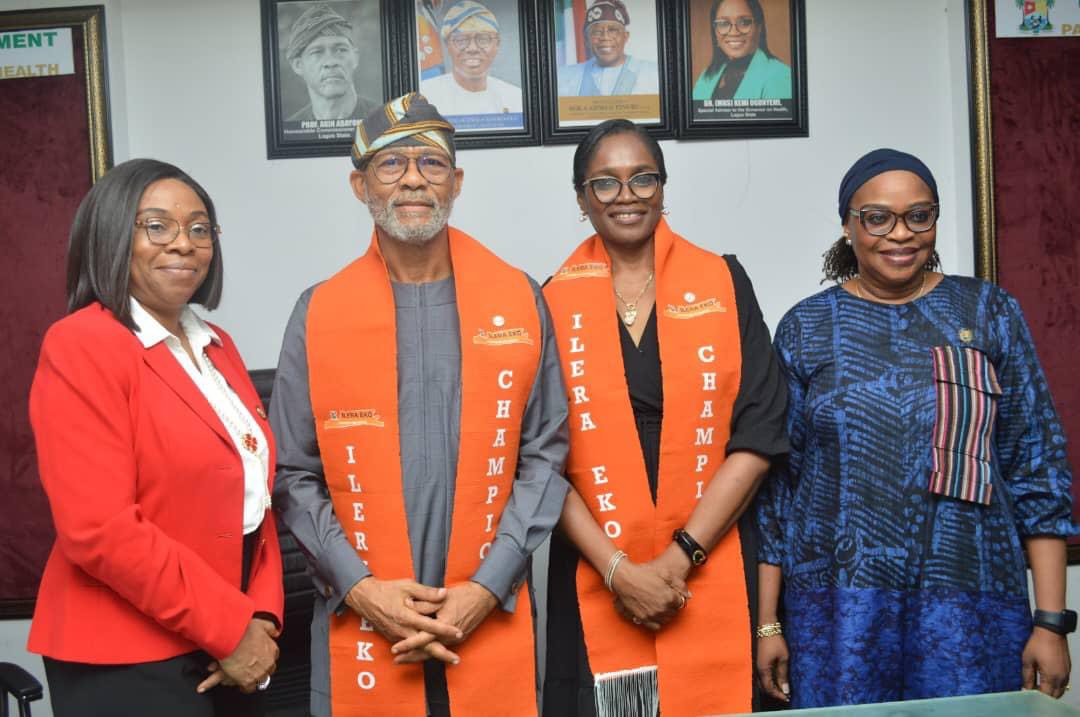
By Modupe Gbadeyanka
Efforts to entrench mandatory health insurance through the Ilera Eko Social Health Insurance Scheme in Lagos State have been stepped by the state government.
This was done with the formal investiture of the Commissioner for Health, Professor Akin Abayomi, and the Special Adviser to the Governor on Health, Mrs Kemi Ogunyemi, as Enforcement Leads of the Lagos State Health Scheme Executive Order and ILERA EKO Champions.
The Commissioner described the recognition as both symbolic and strategic, noting that Lagos is deliberately shifting residents away from out-of-pocket healthcare spending to insurance-based financing.
“We have been battling with how to increase enrolment in ILERA EKO and change the culture of cash payment for healthcare. Insurance is a social safety net, and this mindset shift is non-negotiable,” he said.
He recalled that Lagos became the first state to domesticate the 2022 National Health Insurance Authority (NHIA) Act through an Executive Order issued in July 2024, making health insurance mandatory. He stressed that the decision reflected the Governor’s strong commitment to healthcare financing reform, adding, “When Mr. Governor personally edits and re-edits a document, it shows how critical that issue is to the future of Lagosians.”
Mr Abayomi also warned against stigmatisation of insured patients, describing negative attitudes towards Ilera Eko enrolees as a major barrier to uptake. “If someone presents an Ilera Eko card and is treated as inferior, uptake will suffer. That must stop,” he said, pledging to prioritise insurance compliance during facility inspections. “The key question I will keep asking is: ‘Where is the Ilera Eko?’”
In her remarks, Mrs Ogunyemi, said the enforcement role goes beyond a title, stressing that the health insurance scheme is now law.
“This is about Universal Health Coverage and equitable access to quality healthcare for everyone in Lagos State,” she said, noting that ILERA EKO aligns with the state’s THEMES Plus Agenda.
She commended the Lagos State Health Management Agency (LASHMA) for aggressive sensitisation efforts across the state, saying constant visibility was necessary to address persistent gaps in public knowledge. “People are still asking, ‘What is Ilera Eko?’ ‘Where do I enrol?’ Those questions tell us the work must continue,” she said.
She urged all directors and health officials to mainstream Ilera Eko promotion in every programme and engagement, emphasising that responsibility for health insurance advocacy does not rest with LASHMA alone. “When people come with medical bills, the first question should be: are you insured?” she said, adding that early enrolment remains critical as premiums rise over time.
Earlier, the Permanent Secretary of LASHMA, Ms Emmanuella Zamba, said the investiture marked a critical step in positioning leadership to drive enforcement of the Executive Order across the public service.
“What we are undertaking is pioneering in Nigeria. All eyes are on Lagos as we demonstrate how mandatory health insurance can work,” she said.
Ms Zamba disclosed that enforcement nominees across Ministries, Departments and Agencies have been trained, with a structure in place to ensure compliance beyond the health sector.
According to her, “This initiative cuts across the entire public service, particularly public-facing MDAs, in line with the provisions of the Executive Order.”
She explained that the formal designation of the Commissioner and the Special Adviser as Enforcement Leaders was meant to strengthen compliance, alongside the Head of Service, while also recognising their consistent advocacy for universal health coverage. “This decoration is to amplify their roles and appreciate the leadership they have shown,” she said.
-

 Feature/OPED6 years ago
Feature/OPED6 years agoDavos was Different this year
-
Travel/Tourism9 years ago
Lagos Seals Western Lodge Hotel In Ikorodu
-

 Showbiz3 years ago
Showbiz3 years agoEstranged Lover Releases Videos of Empress Njamah Bathing
-

 Banking8 years ago
Banking8 years agoSort Codes of GTBank Branches in Nigeria
-

 Economy3 years ago
Economy3 years agoSubsidy Removal: CNG at N130 Per Litre Cheaper Than Petrol—IPMAN
-

 Banking3 years ago
Banking3 years agoSort Codes of UBA Branches in Nigeria
-

 Banking3 years ago
Banking3 years agoFirst Bank Announces Planned Downtime
-

 Sports3 years ago
Sports3 years agoHighest Paid Nigerian Footballer – How Much Do Nigerian Footballers Earn


